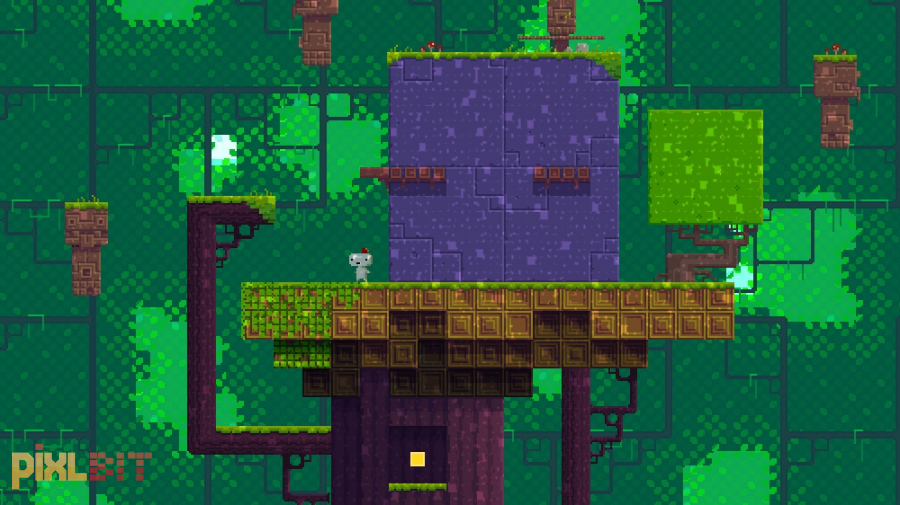Fez Review
|
|
See PixlBit's Review Policies

On 05/06/2012 at 09:39 PM by Chessa DiMola 
|

A trippy, twisted little game that will keep any gamer thinking, guessing, and enthralled for multiple hours – and playthroughs – on end.
I’ve been humbled by Fez. It’s clear to me now that I have not seen it all, nor have I played it all. Rather, I feel more confident than ever, thanks to this unique mind-bending puzzle platformer, that it is still possible to send gamers on a journey quite unlike anything else. In a way, Fez is comprised of dozens of contradictions that all seem to work well together somehow; it’s simple yet complicated, ambiguous yet obvious, charming yet sinister, and frustrating yet incredibly satisfying.
Fez starts players off in the bedroom of a 2D character named Gomez, who is called to the very top of his home world by the town’s elder. Entering the vibrant pixelated world for the first time, it’s hard not to be caught up in a sense of nostalgia elicited by the charming atmosphere and subtle ambient touches that the 8/16 bit era was known for. Gomez and his fellow brethren are by no means complicated in design, yet their simplicity fits well with the background, which paints the picture of a peaceful existence. The moment of fleeting calm is quickly disturbed when Gomez meets the elder and finds himself transported to a strange room with a large cube spinning over head. The cube speaks to Gomez in an unknown language, and in a beam of light grants him a fez right before the screen begins to stutter, the pixels begin to break apart, the music breaks, and the game simulates the crash and reboot sequence of a classic game.
Upon waking, Gomez finds himself back in his room, this time outfitted with the tiny fez gifted to him by the mysterious cube. As it turns out, the fez allows Gomez to shift his perspective, literally granting him the ability to turn entire levels without ever moving himself.
Using this perspective manipulator, Gomez must travel through an assortment of doors and the worlds contained therein to find and collect a variety of objects, including – most notably – golden cubes and anticubes. Accompanying him on his journey is a spinning rainbow colored hexahedron who, quite honestly, is mostly clueless. Like a silly sidekick, his charm, lovable ignorance, and occasional usefulness make him an endearing addition to the game.
The power to manipulate perspective is the most basic gameplay element, and the initial hurdle to overcome. Each level is comprised of four distinct sides that are constructed in 3D but appear 2D. When players use Gomez’s perspective shift ability, the entire level rotates 90° to either the left or right, presenting a new side to the cube-like level.
During a spin, players will get a brief view of the level’s true 3D appearance. Once the rotation has ended, the level will return to its flat 2D state. Although Gomez’s position in 2D space never changes during rotation, spinning the environment does have an effect on Gomez’s place in 3D space. For example, if before players rotate a level Gomez is standing on one side of a building, when they rotate the level 180°, he will be trapped on the other side and appear as a black shadow.
This is just one of many examples concerning the manner in which perspective will affect Gomez’s position on screen and his ability to navigate. In other cases players will have to turn the level in order to climb vines that wouldn’t otherwise connect, create pathways, or even jump between floating platforms that initially seem far apart. Once players are have progressed far enough that they should be sufficiently acquainted with how the mechanism works, the levels will evolve further, becoming more complicated in their design and introducing brand new challenges to solve.
There’s an amazing amount of diversity throughout all of the levels within Fez that to try and describe why they’re all so intriguing would be practically impossible. Players will explore dozens and dozens of worlds, some that are similar, some that are drastically different, and some that don’t seem to fit at all. There are serene worlds set on water, graveyards set against a stormy backdrop, and forests rich with tall trees. Then there are odd rooms comprised of nothing but floating platforms adorned with archaic inscriptions. The phenomenal soundtrack only serves to enhance, and sometimes even define, the mood of any given room.
The combination of locations that feel familiar and those that are almost unsettlingly strange brings an incredible sense of mystery to the journey. This intrigue instills a desire to explore every inch of a level, and doing so is exhilarating.
It’s actually extraordinary that with so many places to explore, every single area is not only distinct but entirely unforgettable. Unfortunately, navigating back and forth from these rooms is a challenge that can take some time to properly understand. In addition to the general confusion with navigation, players will be forced to re-solve parts of levels in order to move onward. But with the help of the map and warps it eventually becomes a bit more manageable, though still tedious, to get around.
However, navigating is not an initial concern, and it will take some time before players need to worry themselves with backtracking. At first, players will be slowly introduced to many of the game’s mechanics simply by navigating the levels themselves. It’s a bit humorous actually, the way Fez patiently and incrementally familiarizes players with the effects of turning a level. Humorous only because as kind as Fez is when concerning exploration, it’s equally as vicious and merciless when it comes to puzzles.
Discussing the puzzles featured in Fez is a difficult task, as revealing mostly any information about them will spoil the fun. Odd symbols and patterns are scattered throughout the world and unlocking their meaning is only the first step to solving many of the puzzles within the game. However, after discovering their meaning, it may seem like Fez will be smooth sailing. Don’t count on it.
The worst thing you can do when playing Fez is think that you have it all figured out. See, you’re always supposed to be thinking outside of the box and experimenting with different ways that hints can be interpreted. Thus, trying to solve each puzzle the same way will eventually be a futile task.
It’s not just symbols either that Fez uses in order to test a player’s ability to utilize reason and logic to solve challenges. Many puzzles are completely unobvious, with your only clue to their existence being a little “?” on the map. A few of the more obvious puzzles include using QR code images (hope you have a smart phone), whereas more ambiguous ones are kept in the aforementioned cryptic rooms.
What I can say without spoiling the fun is always keep your eyes open and pay absolute attention to every facet of the level. Sometimes odd details are there just to confuse you, whereas missing other small subtleties could leave you scratching your head for hours.
Fez is an odd game, there’s no doubt about that, but one that is rich with variety, challenge, and mystery. Overcoming every puzzle is thoroughly satisfying, but it’s not just the puzzles or the levels that make Fez so outstanding. Rather, it’s how well every individual element comes together to form something that is far greater than the sum of its parts.














Comments